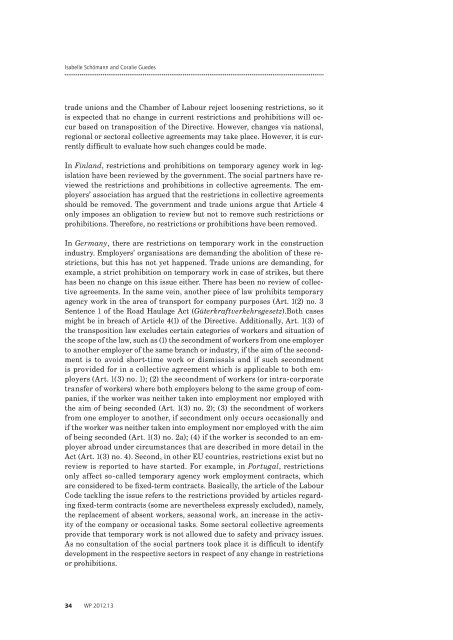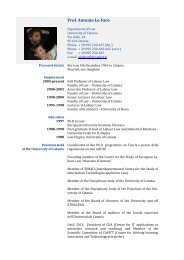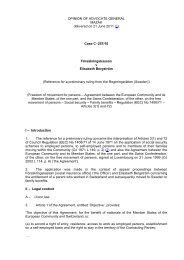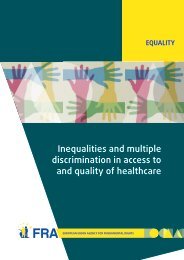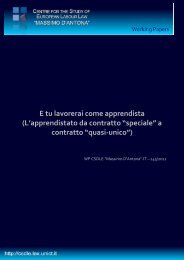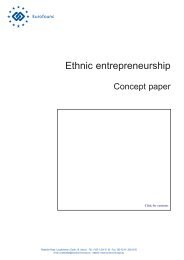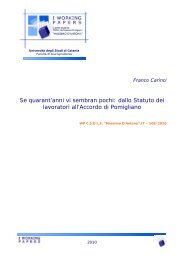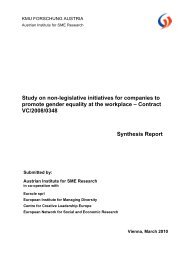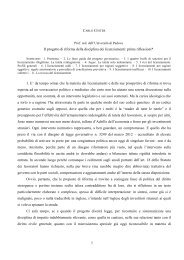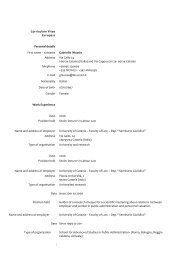Full text - European Trade Union Institute (ETUI)
Full text - European Trade Union Institute (ETUI)
Full text - European Trade Union Institute (ETUI)
You also want an ePaper? Increase the reach of your titles
YUMPU automatically turns print PDFs into web optimized ePapers that Google loves.
Isabelle Schömann and Coralie Guedes<br />
trade unions and the Chamber of Labour reject loosening restrictions, so it<br />
is expected that no change in current restrictions and prohibitions will occur<br />
based on transposition of the Directive. However, changes via national,<br />
regional or sectoral collective agreements may take place. However, it is currently<br />
difficult to evaluate how such changes could be made.<br />
In Finland, restrictions and prohibitions on temporary agency work in legislation<br />
have been reviewed by the government. The social partners have reviewed<br />
the restrictions and prohibitions in collective agreements. The employers’<br />
association has argued that the restrictions in collective agreements<br />
should be removed. The government and trade unions argue that Article 4<br />
only imposes an obligation to review but not to remove such restrictions or<br />
prohibitions. Therefore, no restrictions or prohibitions have been removed.<br />
In Germany, there are restrictions on temporary work in the construction<br />
industry. Employers’ organisations are demanding the abolition of these restrictions,<br />
but this has not yet happened. <strong>Trade</strong> unions are demanding, for<br />
example, a strict prohibition on temporary work in case of strikes, but there<br />
has been no change on this issue either. There has been no review of collective<br />
agreements. In the same vein, another piece of law prohibits temporary<br />
agency work in the area of transport for company purposes (Art. 1(2) no. 3<br />
Sentence 1 of the Road Haulage Act (Güterkraftverkehrsgesetz).Both cases<br />
might be in breach of Article 4(1) of the Directive. Additionally, Art. 1(3) of<br />
the transposition law excludes certain categories of workers and situation of<br />
the scope of the law, such as (1) the secondment of workers from one employer<br />
to another employer of the same branch or industry, if the aim of the secondment<br />
is to avoid short-time work or dismissals and if such secondment<br />
is provided for in a collective agreement which is applicable to both employers<br />
(Art. 1(3) no. 1); (2) the secondment of workers (or intra-corporate<br />
transfer of workers) where both employers belong to the same group of companies,<br />
if the worker was neither taken into employment nor employed with<br />
the aim of being seconded (Art. 1(3) no. 2); (3) the secondment of workers<br />
from one employer to another, if secondment only occurs occasionally and<br />
if the worker was neither taken into employment nor employed with the aim<br />
of being seconded (Art. 1(3) no. 2a); (4) if the worker is seconded to an employer<br />
abroad under circumstances that are described in more detail in the<br />
Act (Art. 1(3) no. 4). Second, in other EU countries, restrictions exist but no<br />
review is reported to have started. For example, in Portugal, restrictions<br />
only affect so-called temporary agency work employment contracts, which<br />
are considered to be fixed-term contracts. Basically, the article of the Labour<br />
Code tackling the issue refers to the restrictions provided by articles regarding<br />
fixed-term contracts (some are nevertheless expressly excluded), namely,<br />
the replacement of absent workers, seasonal work, an increase in the activity<br />
of the company or occasional tasks. Some sectoral collective agreements<br />
provide that temporary work is not allowed due to safety and privacy issues.<br />
As no consultation of the social partners took place it is difficult to identify<br />
development in the respective sectors in respect of any change in restrictions<br />
or prohibitions.<br />
34 WP 2012.13


